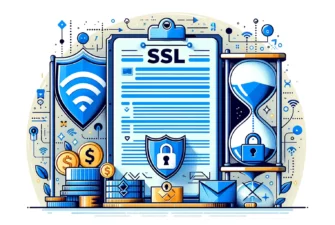
Are you wondering: “Do I need an SSL certificate for my website?“ The answer is a resounding yes. An SSL certificate secures connections between your web server and visitors’ browsers. It encrypts sensitive information, such as personal data and credit card numbers, keeping them safe from cyber threats.
But the benefits don’t end there. SSL certificates also build trust with your audience and improve your website’s visibility on search engines like Google. So, whether you run a business website or a personal blog, getting an SSL certificate should be a top priority.
This article reveals why SSL/TLS and HTTPS are necessary, so let’s explore the reasons behind SSL’s requirement for all websites.
Table of Contents
- Why Do I Need an SSL Certificate?
- What type of SSL Certificate Do I need?
- How to Get an SSL Certificate?
Why Do I Need an SSL Certificate?
You need an SSL certificate for multiple reasons, from website visitors’ sensitive data protection to visibility in search engine results pages. Below, we’ve listed six factors that make SSL certificates a critical element for every website.
1. Data Security
SSL (Secure Sockets Layer) certificates enhance data security for websites and online businesses through SSL encryption. They encode plain text information using encryption algorithms, rendering it unreadable to unauthorized entities. This way, usernames, passwords, and payment information remain protected against interception or tampering.
So, even if someone manages to eavesdrop on the communication, they won’t be able to make sense of the encrypted data without the corresponding decryption key. Whether you log into your favorite social media platform or buy something online, SSL certificates keep your sensitive information safe and secure.
Indicators like the padlock icon and HTTPS in the websites’ URL signal secure connections and give visitors peace of mind when sharing their private information with your website.
2. Trust and Credibility
SSL certificates boost trust and credibility on the web through authentication. Any website requesting an SSL cert undergoes a validation process by a certificate authority (CA), which confirms the domain ownership and, when necessary, the legitimacy of the entity owning the website.
This verification reassures visitors that the website they are accessing is not fraudulent but genuine. For e-commerce websites, this validation is essential as customers must share sensitive information like payment details at the checkout.
3. Protection from Cyberattacks
When you access HTTPS websites, SSL certificates work to prevent man-in-the-middle attacks. These attacks occur when a malicious actor intercepts the communication between your browser and the website’s server, posing as either party to eavesdrop on or manipulate the data exchanged.
However, by verifying the authenticity of the server’s SSL certificate, your browser ensures that you are directly connected to the intended website, making it significantly harder for attackers to intervene unnoticed.
This verification establishes a secured web connection, which protects you from cyber thieves who attempt to exploit vulnerabilities in online communication channels.
4. Enhanced User Experience
SSL certificates significantly improve user experience in several ways beyond just data security and trust. They contribute to smoother browsing by ensuring users encounter fewer security warnings or errors when accessing websites.
Without SSL certificates, browsers often display warnings or block access, which can be frustrating and lead users to abandon the site altogether.
With SSL certificates in place, users can navigate seamlessly without encountering such obstacles, resulting in a more positive overall experience.
Additionally, encrypted connections, empowered by the latest cryptographic protocols, can actually speed up website loading times. How? Well, encrypted data transmission prevents interception and tampering, smoothing communication. Consequently, users enjoy swifter access to website content.
5. Regulatory Compliance
SSL certificates ensure regulatory compliance for websites and online businesses. Regulations like GDPR (General Data Protection Regulation), HIPAA (Health Insurance Portability and Accountability Act), and PCI DSS (Payment Card Industry Data Security Standard) impose strict requirements on data protection and privacy.
SSL certs help websites comply with these regulations by providing a secure environment for sharing sensitive data. For example, the GDPR mandates the protection of personal information during processing and transmission.
HIPAA regulations require healthcare organizations to safeguard patients’ electronic protected health information (ePHI). By implementing SSL certificates, healthcare websites can encrypt patient data transmitted over the internet, meeting HIPAA’s security standards and protecting patients’ privacy.
Similarly, PCI DSS mandates stringent security measures for organizations handling credit card transactions. SSL certificates encrypt payment information, such as credit card numbers and CVVs, during online transactions, reducing the risk of data breaches.
6. SEO Requirement
In the world of SEO, having an SSL certificate isn’t just an option – it’s a necessity. Search engine optimization is a game of inches and every tool you can utilize to gain edge matters.
Google has confirmed that HTTPS is a ranking signal. An SSL certificate will maintain your site’s visibility in search results, driving more traffic. However, not having an SSL certificate on your website may remove it from search engine results pages.
Meeting this SEO requirement is easy nowadays. All you have to do is get an SSL certificate from a valid CA and install it on your server. In the next sections, we’ll discuss what certificate to choose and how to buy it in no time.
What type of SSL Certificate Do I need?
Your website content, budget, and security needs determine the SSL type and validation. Here’s a quick overview of different certs and what they can secure:
By Validation
- Domain Validation (DV) SSL Certificates – These entry-level certs are suitable for small websites, blogs, and personal sites. They verify domain ownership only. You can get them in just a few minutes without any paperwork. DV certificates are the cheapest SSL option on the market, making them ideal for those on a tight budget or with simple security needs. It’s also the only validation type available with free SSL certificates.
- Organization Validation (OV) SSL Certificates – Ideal for small to medium-sized businesses and organizations, OV certificates provide a higher validity than DV certificates. Along with verifying domain ownership, OV certificates also authenticate the legitimacy of the organization that owns the domain. While they require paperwork to confirm the organization’s details, OV certificates offer affordability and enhanced security features. They are suitable for websites handling sensitive information or transactions.
- Extended Validation (EV) SSL Certificates, also known as EV SSL, offer the highest level of validation and trust. They involve a rigorous validation process where the certificate authority verifies the legal identity and ownership of the website. Websites secured with an EV SSL certificate used to display a green address bar in most web browsers with the official company name, but now you can find it in the certificate’s info panel. Extended Validation SSL certificates are perfect for large enterprises, financial institutions, and online banking.
By What SSL Secures
- Wildcard SSL Certificates: Secure a domain and all its subdomains with a single certificate, providing encryption for various subdomains under one primary domain.
- Multi-Domain SSL Certificates: Protect multiple domains with a single certificate, offering flexibility and convenience when managing several websites.
- Single-Domain SSL Certificates: Protect one domain, ensuring secure communication between users and the specific domain they are visiting.
- Multi-Domain Wildcard Certificates: Combine the features of wildcard and multi-domain certificates, securing multiple domains and all their subdomains under a single SSL installation, offering comprehensive security for diverse online environments.
How to Get an SSL Certificate?
At SSL Dragon, we’ve streamlined the process of obtaining an SSL certificate to make it as simple as possible for you. Our intuitive buying process ensures you can secure your website with just a few easy steps.
Whether you’re a small online business owner or a web developer, our platform makes it easy to find the perfect SSL certificate for your project. You can even get a free SSL certificate on a trial to test it out before committing to a paid plan.
With diverse certificate options, we provide the flexibility you need to safeguard your website effectively. Our goal is to offer solutions tailored to your unique requirements.
Are you not sure which SSL certificate is best for you? We offer a wizard to assist you in selecting the best certificate for your website. From understanding the different types of certificates to choosing the appropriate level of encryption, we’ll guide you every step of the way.
With SSL Dragon, you can trust that your website’s data security is in good hands. Get started today and experience peace of mind with a reliable SSL certificate from a trusted reseller.
Bottom Line
We’ve listed the reasons why you need an SSL certificate. Now it’s your turn to select a suitable SSL solution for your website. Follow our quick tips on choosing the right SSL option, and use our large selection of certificates and CAs for the best value.
Don’t compromise your online credibility and the security of your users’ data. Remember, a safe online presence is a must nowadays, and every new website requires an SSL certificate to remain visible in search engines and accessible through modern browsers.
Save 10% on SSL Certificates when ordering today!
Fast issuance, strong encryption, 99.99% browser trust, dedicated support, and 25-day money-back guarantee. Coupon code: SAVE10



























